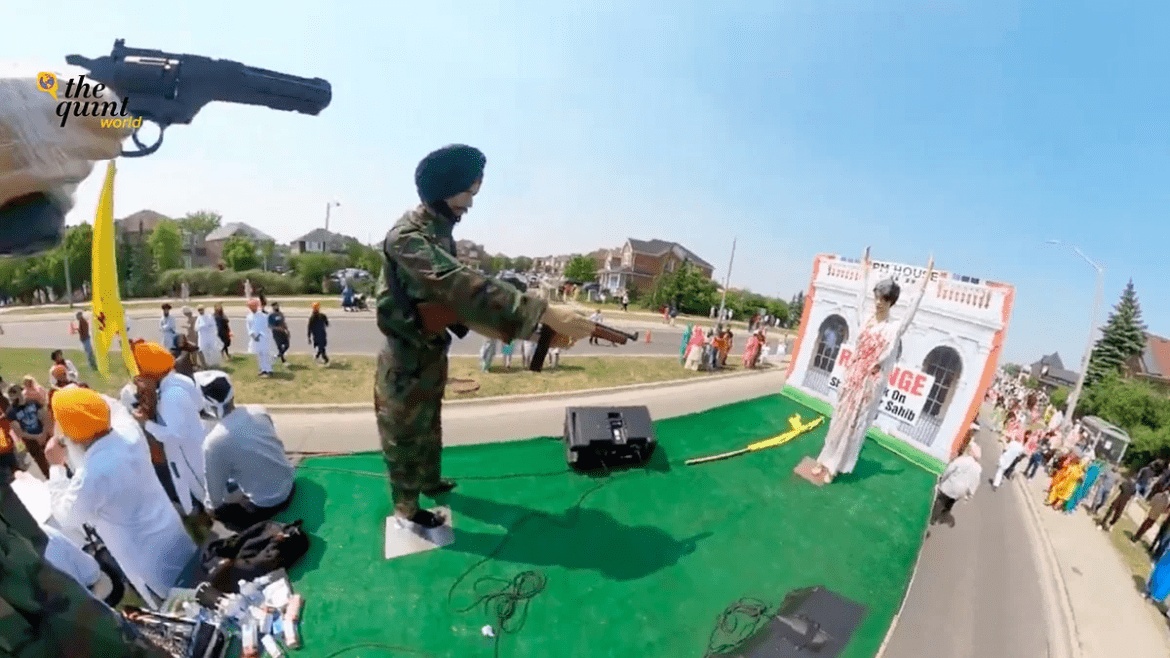AI Generated Summary
- The tableau, marking the 39th anniversary of Operation Blue Star, was a point of outrage and contention as it unapologetically celebrated the assassination of the Prime Minister of the world’s largest democracy, India.
- This year, the cause was a tableau (or jhaki, as called in colloquial Punjabi) that celebrated the assassination of late Indian Prime Minister Indira Gandhi by her Sikh bodyguards, displayed in the annual Sikh Martyrdom Parade on 4 June.
- As the first week of June approached, the citizens of Brampton, Canada, like their counterparts in Amritsar in Punjab, were bracing themselves for the usual outpouring of controversy that had become expected around this time of the year.
As the first week of June approached, the citizens of Brampton, Canada, like their counterparts in Amritsar in Punjab, were bracing themselves for the usual outpouring of controversy that had become expected around this time of the year.
A Troubling Tableau
This year, the cause was a tableau (or jhaki, as called in colloquial Punjabi) that celebrated the assassination of late Indian Prime Minister Indira Gandhi by her Sikh bodyguards, displayed in the annual Sikh Martyrdom Parade on 4 June.
The tableau, marking the 39th anniversary of Operation Blue Star, was a point of outrage and contention as it unapologetically celebrated the assassination of the Prime Minister of the world’s largest democracy, India.
India’s Response and Diplomatic Tensions
The Indian government, including External Affairs Minister S Jaishankar, expressed their displeasure over the tableau, maintaining that such actions were detrimental to the relationship between India and Canada. They questioned why space was being given to those who “advocate violence.”
“It isn’t only one incident, no matter how egregious it may be,” Jaishankar told reporters.
“There is a larger underlying issue about the space which is given to separatists, extremists, and people who advocate violence,” he said.
“We are at a loss to understand, other than the requirements of vote-buying politics, why anyone would do this.”
Canadian high commissioner in India, Cameron MacKay, also expressed concerns, stating that there is “no place for hate in Canada or for glorifying violence.”
Despite this, the Mayor of Brampton defended his administration’s decision to ignore these provocative acts of Khalistani activists.
Echoes from the Past: The 1985 Air India Bombings
This incident shines a spotlight on Canada’s historical missteps with regard to the Khalistani issue. The Air India bombings in 1985, a horrifying event that led to the death of 330 passengers, were carried out by Khalistani extremists. Despite numerous warnings and leads, the Canadian government did not take adequate preventative measures.
The Canadian police were accused of wiping out the recording between the bombings’ mastermind, Talwinder Singh Parmar, and other extremists. This resulted in only one person being convicted for the tragedy.
The Political Power of the Sikh Community and Anti-India Events
It’s been suggested that the Trudeau government, in its current regime, is turning a blind eye to the potential of Khalistanis committing fresh atrocities. In the context of these events, it is also noteworthy that Sikhs are often used as a vote bank by various political parties.
This has been pointed out by a veteran journalist from Punjab, Shekhar Gupta, on The Print Vlog. He noted that the Sikh community often punches above its weight regarding its political influence. This, in turn, may lead to a carte blanche attitude towards allowing anti-India events organized by extremist elements, where inflammatory rhetoric against India and Hindus is commonplace.
Learning from Down Under: Australia’s Handling of Khalistani Elements
Lessons from Australia on handling Khalistani elements have not been heeded. After an assault on individuals of Indian origin in Melbourne in January 2023, Australian organizations have begun denying platforms to Khalistani groups.
Unveiling the Strains in Bilateral Relations
The controversy surrounding the Brampton Parade float came at a time when the National Security Adviser of Canada raised the alarm over purported interference by India in Canada’s domestic matters. In response to these allegations, External Affairs Minister S Jaishankar employed a classic Hindi saying, ‘Ulta chor Kotwal ko dante’, roughly equating to ‘the pot calling the kettle black’, thus turning the accusation on its head.
Respecting the Peaceful Majority: Sikhs in Canada
However, it’s essential to remember that most Sikhs in Canada are peaceful and law-abiding. They shouldn’t be stereotyped or discriminated against due to the actions of a small minority.
Conclusion: A Call for Zero Tolerance and Transcending Vote Bank Politics
Navigating the intricacies of the Khalistan issue presents a considerable challenge for the Trudeau government, requiring the exercise of meticulous diplomatic and political acumen.
The controversy of the Brampton Parade float and the subsequent tensions, both internally and with India, exemplifies the precarious balance Canada must maintain.
Lessons from the past, such as the Air India bombings and the response – or lack thereof – from authorities, are a stark reminder of the potential consequences of unchecked extremism.
With Canadian Sikhs being a significant political influence, the government’s seeming nonchalance towards potential threats and the proliferation of anti-India rhetoric raise valid concerns.
However, the Canadian government must strive to transcend vote bank politics and demonstrate zero tolerance against those who perpetrate extremist acts or celebrate them in such a callous way, as seen in the Brampton Parade.




